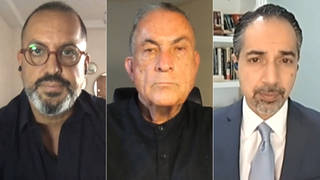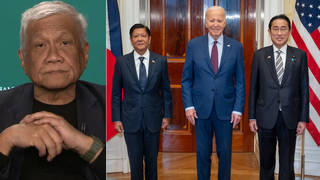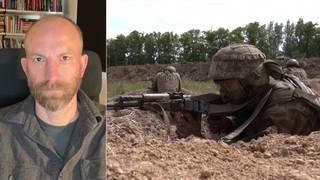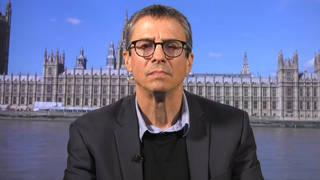
Related
Topics
Guests
- Charlayne Hunter-Gaulta public broadcasting legend whose journalism career has ranged from The New Yorker to NPR. She is currently a special correspondent for PBS NewsHour on a series called “Race Matters,” looking at solutions to racism. Hunter-Gault is also a civil rights activist and leader. In 1961, she was one of two African-American students who desegregated the University of Georgia. Her recent piece for The New Yorker is titled “Surviving School Desegregation, and Finding Hope in #NeverAgain.” She’s also author of several books, including In My Place and To the Mountaintop: My Journey Through the Civil Rights Movement.
Even as racial justice protests have swept the nation in recent years, a new report finds the gains of the civil rights movement have stalled—and in some cases lost ground—over the past half-century. Among the report’s findings: School segregation is on the rise, white supremacist movements are becoming emboldened and more violent, and child poverty has increased—from 15.5 percent in 1968 to 21 percent today. The report comes on the 50th anniversary of a report by the Kerner Commission, which was assembled by President Lyndon Johnson in the wake of uprisings by African Americans in Newark and Detroit. The commission concluded that the United States was “moving toward two societies, one black, one white—separate and unequal.” For more on the civil rights movement’s legacy, the student movements for gun control today, and her own pivotal role in the student-led movement to desegregate U.S. public schools and universities, we talk to legendary broadcast journalist Charlayne Hunter-Gault. She’s won numerous awards for her work at PBS, NPR and CNN, and she’s authored a number of books, including “In My Place,” a memoir of her childhood and her years at the University of Georgia. Her recent piece for The New Yorker is headlined “Surviving School Desegregation, and Finding Hope in #NeverAgain.”
Transcript
AMY GOODMAN: This is Democracy Now! I’m Amy Goodman. We’re talking to the legendary civil rights, human rights activist and journalist, Charlayne Hunter-Gault. And I want to being Part 2 of our conversation by turning to another legendary figure, John Lewis. It was in [ 2012 ] that we sat down with the many-term Democratic congressmember from Georgia, leader of the civil rights movement, served as chair of the Student Nonviolent Coordinating Committee, helped organize the Freedom Rides. Interesting that with the Freedom Rides, his elders, I believe including Dr. King, were saying, “This is not the moment. We don’t want you riding through the South at this point.” But the young people took charge. John Lewis was also the youngest speaker at the 1963 March on Washington. And I asked him about the remarkable speech that he delivered on that day, August 28th, 1963. And he talked about some of the controversy, because A. Philip Randolph, Dr. King and others said he had to water down that speech. He had to tone it down. This is what John Lewis said.
REP. JOHN LEWIS: I was asked to change the speech. Some people thought the speech was too radical, too militant. I thought it was a speech for the occasion. It represented the people that we were working with. Some people didn’t like the use of the word “revolution” or the use of the phrase “black masses.” A. Philip Randolph came to my rescue and said, “There’s not anything wrong with the use of 'revolution.' I use it myself sometimes. There’s not anything with 'black masses.'” So we kept that part in the speech. But near the end of the speech, I said something like, “If we do not see meaningful progress here today, the day may come when we will be forced to march through the South the way Sherman did—nonviolently.” And people thought we couldn’t make a reference to Sherman, and so we deleted that.
AMY GOODMAN: That’s John Lewis. This is the acclaimed actor and activist Danny Glover reading excerpts of the speech that John Lewis did not deliver. He did give a speech, but this is a part of what he wasn’t allowed to say at the March on Washington.
DANNY GLOVER: [reading John Lewis] “To those who have said, 'Be patient and wait,' we must say that 'patience' is a dirty and nasty word. We cannot be patient. We do not want to be free gradually. We want our freedom, and we want it now.”
AMY GOODMAN: “We want our freedom, and we want it now,” Danny Glover reading John Lewis, the edited excerpt, the part that didn’t get on in that speech, where Dr. King gave his “I Have a Dream” speech and John Lewis gave his edited speech. Charlayne Hunter-Gault, your thoughts on this and the role of young people in activism, even bucking their very respected elders within the movement?
CHARLAYNE HUNTER-GAULT: Well, let me just say that there were a lot of elders who supported us. I remember that a lot—when I would go home to Atlanta on the weekend from Athens, about 73 miles away, and the students who called themselves the Committee on Appeal for Human Rights would have been demonstrating, getting arrested, going to jail. And on the weekends, when there was no activity, we partied. But we’d party with the older people with us, who were supporting us. So, it wasn’t the case that every adult didn’t support us. There were a lot who did. But then there were those who didn’t.
And I think about 16-year-old Brenda Travis in McComb, Mississippi. At the time, a lot of the young civil rights activists were a bit older and were concerned for the safety of the younger people, the high school students. But Brenda Travis said, “No, I want to be a part of this.” She sat in at the Greyhound bus station. She was arrested. She was—she was actually treated worse than a lot of the older civil rights workers. She was sent to reform school. But she never gave up. She stayed out there.
And that’s what I think about when I see these young people from the Florida high school. There is precedent for that. There is history to what they’re doing today. And I think that if they—they may have reacted to the tragedy of the moment, but one of the things that I think will help them stand the test of time and challenges is the history, because I think of the kind of history of Brenda Travis and John Lewis and Martin Luther King and Julian Bond and my friend Carolyn Long Banks from Atlanta, who was a part of that movement, whom I invited to come to the University of Georgia when I spoke there the other day, when I think of the sacrifice, but the commitment and the dedication that they had. They wore armor, and part of their armor that protected them, even in those trying, difficult circumstances, was the history, history that goes all the way back to the founding of this country and the Constitution and then the changes that had to be made to include better equal rights for everybody that came along some years later. So, you know, history, I think, will help them stay on course for their goals.
AMY GOODMAN: And speaking of young people, Charlayne, we just got word that in Montgomery, the city will honor and celebrate civil rights activist Claudette Colvin today. About nine months before Rosa Parks, it was Claudette Colvin who refused to give up her seat to a white passenger on a Montgomery bus. She was arrested March 2nd, 1955. If you remember, Rosa Parks, it was in December of 1955. Because Colvin was just 15 at the time, the NAACP did not go with her at the time. But we got to speak to her in our studios about her refusal to give up her seat to a white person, helping to spark the historic Montgomery bus boycott. Her legal challenge was the one that went all the way to the Supreme Court, the case that led the court to order an end to bus segregation in Alabama. Claudette described what happened when the police came to haul her off the bus.
CLAUDETTE COLVIN: “Why didn’t you get up when the bus driver asked you, and the policemen?” I say, “I could not move, because history had me glued to the seat.” And they say, “How is that?” I say, “Because it felt like Sojourner Truth’s hands were pushing me down on one shoulder and Harriet Tubman’s hands were pushing me down on another shoulder, and I could not move. And I yelled out, ’It’s my constitutional rights.’”
AMY GOODMAN: That was Claudette Colvin. If you, Charlayne Hunter-Gault, could talk about actually the role that Claudette Colvin, 15 at the time—and then, of course, Rosa Parks, who was older. But that was just what? Six years before—five years before you engaged in your historic act, desegregating the University of Georgia. The impact of each movement on the next? And we can take it right through to today, with the students.
CHARLAYNE HUNTER-GAULT: Well, to be sure, I mean, by the time we applied, Hamilton and I, in 1959, as you just pointed out, there had been a precedent in other states, and Georgia was a little bit behind. But there was an activist group of people, including a Clark College, the historically black Clark College, an English professor there by the name of Carl Holman, and several of the Atlanta businessmen, medical doctors got together. They were a part of an organization called the Atlanta Committee for Cooperative Action. And they decided that Atlanta’s time had come.
And that’s when they approached Hamilton and me—we were the top—two of the top students at our school—and asked if we would be interested in applying to the University of Georgia. And as you pointed out earlier, I was very interested because it was the one school in the state that had a journalism program. And Hamilton loved Morehouse College, where he initially started while the case made its way up through the courts, but Georgia had all of the facilities, again, that our parents’ taxes paid for. So we were very interested.
And when we first—the first school they wanted us to apply to was Georgia State, and we went downtown. And what’s interesting is that we were so well educated in our historically black schools. Again, because of the history that we had been taught, we didn’t have first-class citizenship, but our parents and our teachers had given us a first-class sense of ourselves. So, when we went down to look at Georgia State and looked at the limited curriculum for both us, Hamilton was the one who said, “No, I want to go there.” And he pointed towards Athens, Georgia. And the adults who had gone with us were a little bit taken aback because they were concerned that they didn’t have any security for us there. But then they said, “How can we deny them?” And that’s how we—that’s how we got started. But it was our history that gave us a sense, as I said, a sense of ourselves as being first-class citizens, and we weren’t going to accept anything less.
AMY GOODMAN: Now, you—
CHARLAYNE HUNTER-GAULT: And I think that was the case with the other students. Sorry.
AMY GOODMAN: You talked about journalism. And you started early. You were writing for The Red & Black, the college paper. But can you talk about how segregation affected you doing that? And then, also, talk about working as a reporter for The Atlanta Inquirer, where the renowned civil rights champion Julian Bond, who we lost not so long ago, was the managing editor.
CHARLAYNE HUNTER-GAULT: Yes, well, I never wrote for The Red & Black. I volunteered, but the university itself was still segregated—I mean, they kept the lunchrooms segregated for as long as they could—so that there were things around the campus that were not really that open to us. And like the bowling alley was in the town of Athens, where the students went for bowling. And so, Athens was still segregated. So there was no work for me. I used to sit around there, and I finally got tired of sitting around.
And Julian Bond and Carl Holman, whom I mentioned earlier, had started a little upstart black newspaper to cover the activities of the students, because the black newspaper—here, again, was a situation where you had a black newspaper, the oldest in the country, the Atlanta Daily World, but it had a lot of white advertisers, and so it didn’t cover the students. If it did, it wasn’t sympathetically. And the same with the white newspapers, The Atlanta Journal and Constitution. So this paper started, and specifically, in the beginning, to cover the student movement. So, I worked there with them in Carl Holman’s basement on the black side of town. And the students would demonstrate in the morning, be arrested by noon or 1:00 or so, and then get bailed out in the afternoon, and then come to the basement and tell us the stories. And I would write them up. And then they started a jail without bail, so that they could officially challenge the separate-and-unequal laws.
And so, then I spread out into the town, into Atlanta, doing other stories, like how the schools there were still segregated. And so, while there was—there was a high school, David T. Howard High School, and it was overcrowded, and so they set up, you know, almost like railway cars for the spillover students, who then had to walk from Howard High School, pass the white school that was virtually empty, to go into these overcrowded and uncomfortable temporary cars, facilities. And so, I wrote about that. And I got empowered, first, as a journalist, talking to important people. When I called the white school superintendent—her name was Ira Jarrell‚ and I said, “I’m Charlayne Hunter from The Atlanta Inquirer, and somebody said, “Hold on a minute,” I never really expected her to come to the phone. And, sure enough, she came to the phone. So that was a real empowerment for me, that, you know, journalists can be servants of the people and have people in positions of responsibility respond. You have to press, then as well as now, regardless of, you know, the things you get called when you try to do that.
AMY GOODMAN: You know, Charlayne Hunter-Gault, you went on to win many prizes, Emmys and other major journalistic prizes, working for NPR, for PBS, the NewsHour, working for CNN. You worked out of South Africa for years. You come back to this country. And I wanted to end by asking you about a report marking the 50th anniversary of the landmark Kerner Commission, which famously concluded the U.S. was “moving toward two societies, one black, one white—separate and unequal.” Well, the new report found civil rights gains of the past half-century have halted—and in some cases really moved back. For example, poverty, deep poverty for kids, moving from 15 percent, what, 50 years ago, to 21 percent today. Talk about how far we’ve come or how far we have regressed.
CHARLAYNE HUNTER-GAULT: Well, as you can see from my own history, I’ve had tremendous success in my work as a journalist. And there’s so many other people who have moved up to places where they never expected they would be, back in those early days. So, we have a real strong group of people who have progressed, African Americans who have progressed, in this system, thanks to the laws of this country. But as Julian Bond told me when I first was working for The New Yorker back in the mid-'60s—he came to New York to make a talk—to give a talk, and he told people, “You can't stop fighting. You have to go back to your communities and work there, despite the fact that some people have kept on keeping on,” as we used to say back in the day. I think we got a little bit complacent when we saw some of the progress that was being made.
And so, I think that new movements are starting. You have the women’s movement, which includes African-American women. You have the movement that emerged in Hollywood. You have all of these new movements that are going to pick up the baton, because, for a while there, I think we got a little complacent. And the things that you’ve just cited are things that should energize people who believe in this country, who believe in its greatness and want to keep it great. But it takes work. I remember I interviewed Madeleine Albright once, and someone had criticized something that the United States had not done according to its constitutional promise. And Madeleine turned to me, she said, “Honey, don’t you know? Democracy is messy.” And so, you know, you have to keep on keeping on, again, as we used to say back in the day.
I mean, it’s troubling to me that, given the experience you cited and I talked about a few minutes ago, where I walked onto campus more than 50 years ago, when students were yelling ugly words at me and calling me the N-word and all that, and you’re hearing that on campuses today. And I think that’s a failure of our educational system. It’s a failure to teach our history. There have been reports by the Southern Poverty Law Center that slavery, in its reality, is not being taught in our schools today.
And so, we have a lot of work to do in our messy democracy. But there are people like you, Amy, who look—who reveal stories of justice denied. And there are other people who are reporting news that is not fake, but that points to the work that has yet to be done. And I just hope—I have a fellowship at University of Georgia that I’ve started, called Giving Voice to the Voiceless, in which we’re trying to raise a half a million dollars to get students going to places, to award them grants to go to places, to give voice to the voiceless. And that, too, is a way of energizing a new generation, because their time has come.
AMY GOODMAN: Well, Charlayne Hunter-Gault, we want to thank you so much for being with us, public broadcasting legend, whose journalism career has ranged from The New Yorker to NPR, PBS, CNN, currently special correspondent for the PBS NewsHour on a series called “Race Matters,” looking at solutions to racism. Charlayne Hunter-Gault is also a civil rights activist and leader. and, yes, in 1961, one of two African-American students who made their way through Klan country, walked onto the University of Georgia to desegregate it. We will link to your piece in The New Yorker, that you just wrote, headlined “Surviving School Desegregation, and Finding Hope in #NeverAgain.”
On this day, March 2nd, 63 years ago, in Montgomery, Alabama, Claudette Colvin, a 15-year-old teenager, sat down on a bus and refused to get up for a white passenger, nine months before Rosa Parks. And we will also post online at democracynow.org our extended interview, over the next few days, that I did with Charlayne Hunter-Gault, as well as the interview that we did with Claudette Colvin in our studio here, describing her experience.











Media Options